Briefing on the program
From April 9th to June 30th of 2012, Beijing Administration Insitutue organized the Bangladesh-China Cooperation Training Program for Bangladesh High and Mid-level Civil Servants based on the Agreement of Cooperation signed between BAI and Management and Training International (MTI) and with the letter of authorization to BAI from the Embassy of the People’s Republic of Bangladesh. The program was in collaboration with Bangladesh Public Administration Training Centre (BPATC) and was supported by the Ministry of Public Administration of the People’s Republic of Bangladesh. The study tour of the Bangladesh government officials in China is part of their overseas study experiences in participating in the Senior Staff Course (SSC) or Advanced Course on Administration and Development (ACAD) organized by BPATC.
Wang Minzhong, Executive Vice-president of the Beijing Administrative College, and other leaders of the College, including vice presidents Mr. Yin Qingyan and Mr. Han Jiugen, and college committee member Mr. Zhou Chunming, have given high priority to this program. Detailed preparations and coordination among members of the Department of International Cooperation and Exchange, Division of Academic Affairs, Division of Trainees’ Work, Support Service Center, Division of Administrative Management, Department of Graduate Studies, IT Center, Library, and other related departments have enabled the training program to proceed with purpose and efficiency. A.Z.M. Shafiqul Alam, Rector & Course Adviser of BPATC also received training in BAI and gave strong support to the implementation of the program.
There are altogether 7 programs for the whole training, 3 of which are for SSC and 4 for ACAD. In Each program, there are around 30 participants and altogether there are 222. Duration of each program is around 10 days. All 7 programs aim to enriching participants’ knowledge and experience in areas like administrative reform, public service management, human resources management, maintenance of transparency and accountability in public service etc.. In each program, 4 to 5 field trips are incorporated for trainees to directly feel the achievements that China’s development brings, to better understand the actual conditions of China’s development, and to draw experience to duplicate China’s success in the Bangladesh context.
In designing course syllabus, BAI adopts a variety of training methods including lectures, discussions and field trips. Courses for SSC focus on Administrative Reform & Public Service Delivery and ACAD courses focus on HRM & Economic Development, Local Government Best Practices, Good Governance and Transparency & Accountability. Discussions are carried out after each lecture. Field trip destinations include Capital Museum, Beijing City Planning Exhibition Hall, Luiminying Ecological Farm, Beijing Central Business District, Zhongguancun National Innovation Demonstration Zone etc.
Following table is on the basics of the 7 programs, including the duration, number of participant and batch information:
Table 1—Overall review on the 7 programs
|
Serial
|
Program
|
Duration of the program
|
No. of Participants
|
|
1
|
78th ACAD
|
April 9 to April 18
|
33
|
|
2
|
56th SSC
|
April 23 to May 2
|
29
|
|
3
|
57th SSC
|
May 3 to May 12
|
26
|
|
4
|
80th ACAD
|
May 13 to May 22
|
33
|
|
5
|
82nd ACAD
|
May 24 to June 2
|
26
|
|
6
|
58th SSC
|
June 3 to June 12
|
31
|
|
7
|
84th ACAD
|
June 21 to June 30
|
44
|
Lecture Sessions
To meet the requirements of the Bangladesh participants, BAI has provided appropriate lectures for them and has chosen the most qualified professors for delivering the lectures.
The general lecturer’s information is briefly outlined in the following table:
Table 2—General lecturer information
|
Serial
|
Lecturer
|
Qualifications
|
Title of Lecture
|
|
1
|
Mr. Yin Qing Yan
|
Vice president and professor of BAI, MA degree in law
|
China’s Political System
|
|
2
|
Mr. Zhou Chunming
|
Member of BAI college committee, professor and doctor of law
|
China’s Political System
|
|
3
|
Mr. Liang Jun
|
Doctor of philosophy, professor, director of the Dept. of International Cooperation & Exchange
|
China/ Beijing/ BAI
|
|
4
|
Mr. Ga Rida
|
Doctor and professor in Philosophy, director of the Dept. of Sociology
|
Grid System of Social Management
|
|
5
|
Mr. Ma Zhanwen
|
Doctor of law, Professor, deputy director of the Dept. of Politics
|
Anti-Corruption in China
|
|
6
|
Mr. Zeng Xianzhi
|
Associate professor, director of the Dept. of Business Administration
|
China’s HR Management and Economic Development
|
|
7
|
Mr. Dong Xiaoyu
|
Doctor, associate professor and deputy director of the Dept. of Public Administration
|
China’s Administrative Reform and Local Governance
|
|
8
|
Ms Cao Ying
|
Doctor degree in Business and associate professor in the Dept. of Business Administration
|
China’s Public Service Reform
|
Lectures for all 7 programs include China’s Political System given by Prof. Yin Qingyan and Prof. Zhou Chunming alternatively and lecture on China/Beijing/BAI given by Dr. Prof. Liang Jun.
China’s Political system mainly centered on the National People’s Congress in China, the system of multi-party cooperation and political consultation, the system of self-government in ethnic autonomous region and grass-roots autonomy system. During class discussion, when the trainees found their opinions were not in consistence with the lecturer’s, they seldom hesitated to argue with the professor. After the lecture, many trainees said the course was inspirational and made them better understand China’s political system.
The lecture China/ Beijing/ BAI delivered by Mr. Liang Jun was non-academic, inviting and close to reality and life. Friends from Bangladesh enjoyed his introduction and were occasionally impressed by his sense of humor, gentleness and kindness. After Dr. Liang’s extensive presentation, trainees were excited and they asked a lot questions about Beijing’s history and city development, and the majority of them started expecting the upcoming tour. The lecture was followed by a sight-seeing in BAI history exhibition hall.
Lecture specially designed for SSC course include China’s administrative reform, public service delivery and grid management.
Mr. Dong Xiaoyu gave trainees new insights into China’s administrative reform and local governance through his lecture. The main contents comprised: A. a Review and Comments on China’s Administrative Reforms; B. Local Governance------ Profile and Reform; and C. Comments and Questions. These Bangladesh elites couldn’t wait to raise questions. Dr. Dong answered their questions with detailed explanations and vivid examples. They also showed a lot of concerns about good local governance and anti-corruption measures, hoping that China’s success and lessons may lend them some experience in the government reforms and self-improvement in their own country.
The lecture on China’s Public Service’ Reform was delivered by Ms. Cao Ying. Her lecture was on China’s public service reform by taking BOT as examples. Ms. Cao divided her lecture into three parts: 1. Theoretical Classification of Public Service; 2. Practices and Problems; and 3. Future Trends and International Experiences. She also explained common mode of financing and operating and introduced international experiences by comparing the subway projects in China and in Europe. At last, she suggested four strategies in the future to provide better public service. After the lecture, participants asked questions which they concerned most and sought solution from Dr. Cao. Ms. Cao elaborated on their questions.
The lecture of Grid System of Social Management was given by Mr. Ga Rida, with special focus on grid system for Beijing’s social management. Professor Ga delivered his lecture in English, with the help of his bilingual PPT courseware complete with texts and graphics, thus making his presentation efficient, convenient and easy to understand. Prof. Ga’s lecture on grid system had involved many advanced science and technology and hi-tech equipments, at which the attendants marveled a lot. As soon as Prof. Ga finished his presentation, trainees posed questions concerning China’s land policy, housing policy, agricultural problem, etc. Their questions were practical and detailed because their government was facing similar problems, and they wanted to find some clues from China’s solutions.
Lectures for ACAD course focus on anti-corruption and HRM management and economic development.
Mr. Ma Zhanwen introduced Anti-Corruption in China Since 1949 in his lecture. His lecture was separated according to the eras of Chairman Mao, Deng Xiaoping, Jiang Zemin and Hu Jintao respectively, the social backgrounds were different, and the causes for corruption and the measures to combat corruption were also varied.
The lecture on China’s Human Resource Management and Economic Development was delivered by Mr. Zeng Xianzhi. The contents of his lecture included China’s population situation, the full application of China’s human resources before and after the reform and opening up, China’s policy concerning birth control, China’s demographic dividend periods, China’s population distribution and density, China’s economic development and growth. He also talked about Made in China products based on China’s cheap labor force and human resources advantages. Nevertheless, in order to make China design and China brand products, the country still needs to take more efforts in making existing human resources into talents and to develop more hi-tech new emerging industries to get the commanding point for new developments. The lecture was always ended with heated discussion on the relationship between population and economic development, as Bangladesh has similar situation with China.
“Seeking truth from the fact”(实事求是) is an ideological line of CPC (Communist Party of China), and these four Chinese characters are inlaid on a stone foundation before the hotel where all participants lived. If the lectures taught participants what the truth is, the field trips were to test the truth they had learnt.
Field Trips
Field trip destinations include Beijing City Planning Exhibition Hall, Capital Museum, Beijing’s CBD, Zhongguancun Hi-tech Exhibition Hall, Liuminying Farmland and Beijing Shishahai Sub-district Community.
Beijing City Planning Exhibition Hall has a variety of exhibitions. Participants can see Beijing City Master Plan, Beijing------A Low-carbon Eco-city, Beijing Transportation, Beijing Olympic Venues, Multimedia Movie Hall and Dynamic Movie Hall on the fourth floor; The third floor exhibited the City Evolution of Ancient Beijing, Beijing City Cultural Preservation, Model of Beijing City Planning and Model of the Forbidden City; On the second floor participants saw the bronze relief of the old city of Beijing made with a scale of 1:1000, fully illustrating the overall layout and characteristics in 1949; The first floor displayed a copper sculpture of Beijing Gulf which showed the geographic features of the small gulf-like plain of Beijing surrounded by mountain ranges on its three sides. The Bangladesh visitors had not only seen the great achievements of Beijing urban planning construction, but also marveled at the expectation of the splendid future of Beijing city development.
The newly built Capital Museum was open to the public officially in May 18, 2006. It constitutes three exhibition areas: Basic Exhibitions, Special Exhibitions and Art Exhibitions, and Temporary Exhibitions. Treasures like bronze, ceramics, Buddhist statues, jade, gold and silver ware, currency, calligraphy, paintings, brocade and embroidery and private collections are displayed in these three exhibition areas. Folk customs is also exhibited in form of pictures or miniatures in the Capital Museum. Beijing in the Past and Beijing Today makes huge contrast; Family Life in the Hutong reappears the ancient Chinese style wedding and the long celebrating procession; Other items includes Beijing Delicacies, Operas and Quyi, Beijing Handicrafts and Time-honoured Brands in Beijing.
The Beijing Central Business District is Beijing’s new “city card”. Covering an area of 3.99 square kilometers, Beijing CBD hosts the headquarters of many worlds’ 500 largest companies like Motorola, HP, Sumsang, Deutsche Bank etc. CCTV (China Central Television) and BTV (Beijing Television) also choose their new sites in the CBD. It is a center for major high-end companies doing business in finance, insurance, real estate and Internet, a pool of talents and personnel with capability and expertise in using financial instruments, an embodiment for China’s fashion, and a cradle for the start-up and growth of countless small and medium enterprises. Bangladesh visitors not only marveled at the magnificence of the China’s largest LED screen on the top------The Place Shopping Mall, but also admired the prosperity and success of Beijing’s CBD development.
Zhongguancun National Innovation Demonstration Zone demonstrates the representative technology and products invented and produced by pioneering companies in China in different hi-tech field containing new IT, aviation and aerospace, biopharmaceutical, new material, new energy, energy conservation and environment protection, new energy-driven car, high-end equipment manufacture. The Bangladesh visitors were excited and curious because they were either civil servants in the government or senior officers in the Bangladesh military force and the exhibits often caught their attention due to their job or duty concerns.
Luiminying Ecological Farm in Daxing District, Beijing, embodying the development level of China’s ecological agriculture, was the only field trip which was directly related to agriculture. In 2004, former UN Secretary-General Kofi Annan visited this farmland and spoke highly of it because this farm had created a virtuous circle of agricultural materials and energy by making full use of solar power, biological energy and renewable energy. Participants visited the auditorium where they were briefed, then the residencies of farmers where participants took many pictures because it was so different from the farmer’s house in their own country. And they also saw what the local people were so proud of ------organic fertilizer and methane gas station.
Beijing Shishahai Sub-district Community has shown for the trainees a local governance best practice. Shishahai was a lake and got its name from ten Buddhist temples around it. Many celebrities’ residencies were in this community. This area is famous for its snacks and bars nowadays. Covering an area of 5.8 square meters, the sub-district, as part of Xicheng District, is composed of 29 community residents committee, which boasts 42 826 households with a permanent resident population of 105 131. It has set good examples for the local governance in sub-district level.
Feedbacks from participants
Bangladesh officials from all sessions have said that their sojourn in Beijing and the guidance of teachers and classroom discussions have deepened their understanding of China’s public administration, governance, and reasons behind its rapid economic development. Furthermore, they have observed that China has many methods and experiences worthy of study and emulation in Bangladesh, just as Gazi Mohammad Julhash from 56th SSC said “All the sessions are relevant in Bangladesh perspective, particularly the public service reform and 4-level grid management system are very useful and have benefited us a lot. Visit of hi-tech park has immensely benefited us for digital Bangladesh”. In addition, all were deeply impressed by the warmth of the Chinese people, their friendliness, and their hard-working spirit. As each session neared its end, Bangladesh officials found themselves reluctant to leave and looking forward to another opportunity to visit China.
The following comments were quoted from the program evaluation form submitted by the participants, in which most of the participants held positive opinions on the program and also gave some very good suggestions.
This is indeed a very useful program, undertaken to study and compare the Chinese public sector. The knowledge and experience will help Bangladesh very much. The cooperation with BAI of China is worth mentioning. ----Lieutenant Colonel Muhammad Emdad Ullah Bhuiyan Psc. from the 78th ACAD
It had been very helpful for understanding the core driving forces of Chinese development. Bangladesh Beijing a developing country needs to analyze and understand the critical factors for development and learn how to implement them in her own context. The lesson learnt is the importance of having a national consistent strategy. ---- Lt. Commander Mohammad Abul Hasan from 78 ACAD
Before coming here, I did not know about China. Now, I have got opportunities to know China’s policy, social change, and free economy, which is helpful to me to implement this knowledge to my country. ----Md. Rafiqul Islam from 56th SSC
It was an excellent training program which was enriched with China’s political, social, educational and economic system in contrast with Bangladesh. All aspects of the program are well disciplined, organized and time bound. ---- Dr. Aftabun Nahar Maksuda from 57th SSC
The program has covered the important areas of development of China. BAI can introduce some effective visit outside Beijing. Course coordinators are very hard working, with smiles always. I wish good luck of China. ----Major Mr. Md. Asif Iqbal from 82nd ACAD
Class lecture time may be increased. Detail policies for programs, strategies, methods, techniques of development process of China should be elaborately discussed. ---- Amar Chan Banik from 84th ACAD
I think this is very relevant and useful program for us. Key areas are comparison between Bangladesh and China in public administration, knowledge in good governance, anti-corruption drive etc. The cooperation between China and Bangladesh will be strengthened by this course. ---- Director Md. Afzal Hossain from 78th ACAD
Moving Ahead
Bangladesh Public Administration Training Centre (BPATC) and BAI have similar function for training civil servants and government officials and BPATC was quite satisfied with the above training program organized by BAI. Recently, the two sides had decided to further their cooperation in this field based on the MOU signed between them.
Hopefully next year, more Bangladesh officials will come to BAI to receive training and BAI, with the previous experience acquired, is full of confidence in making the program even more fruitful.
(Draft by Guo Shengyang, Finalized by Chen Cong, Proofread by Hu Yu)
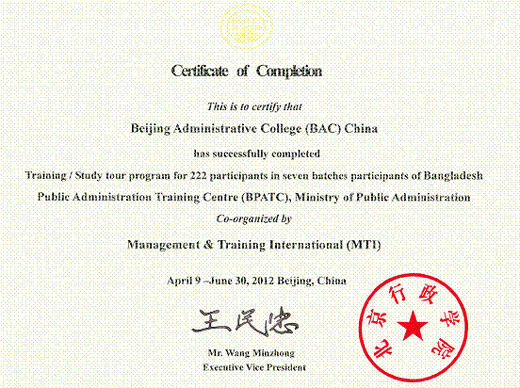
Photo 1: Certificate of Completion for the 7 batches

Photo 2: Training plan and syllabus

Photo 3: Mr. Wang Minzhong, Executive Vice President of BAC,
received Mr. A.Z.M. Shafiqul Alam, Rector and Course advisor of BPATC
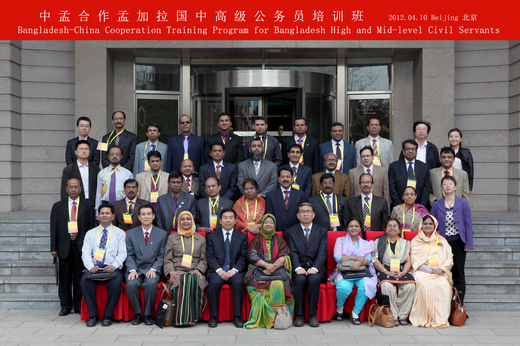
Photo 4: 78th ACAD
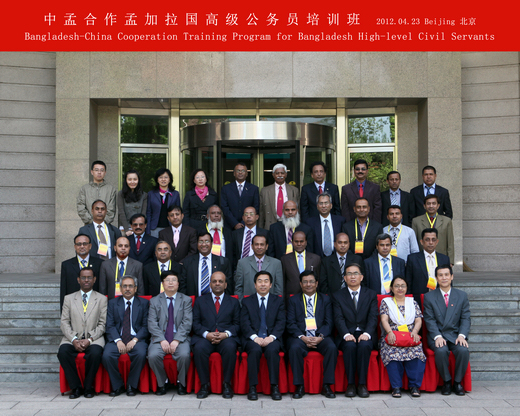
Photo 5: 56th SSC

Photo 6: 57th SSC
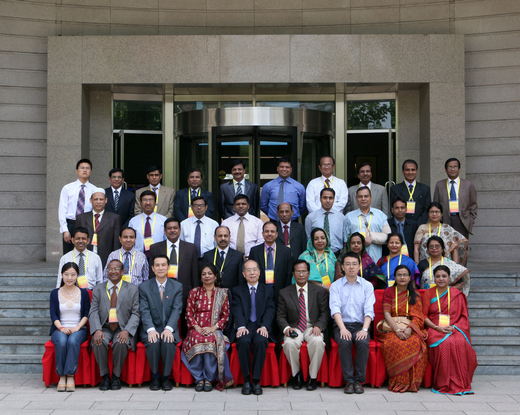
Photo 7: 80th ACAD
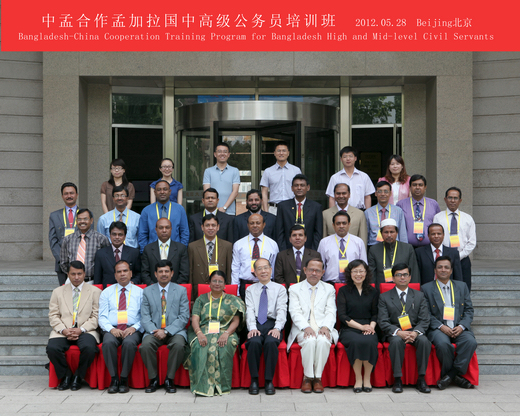
Photo 8: 82nd ACAD
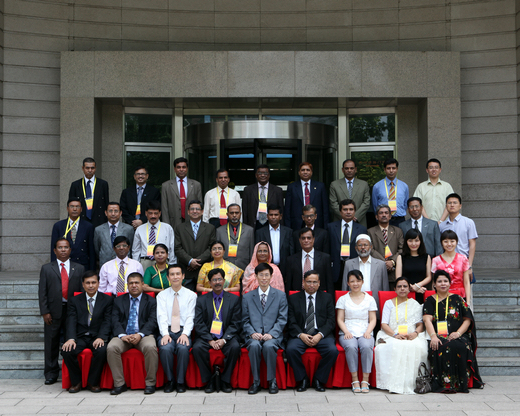
Photo 9: 58th SSC
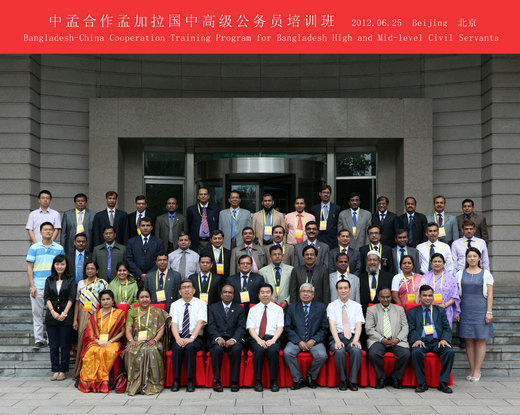
Photo 10: 84th ACAD
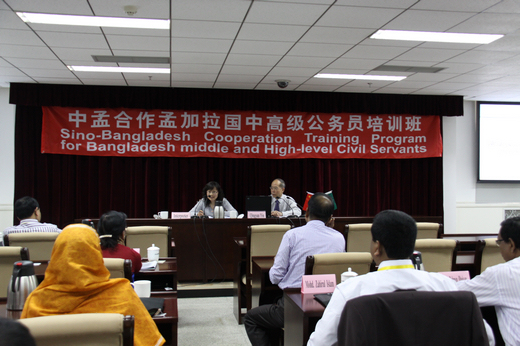
Photo 11: Mr. Yin Qingyan’s lecture on China’s political system
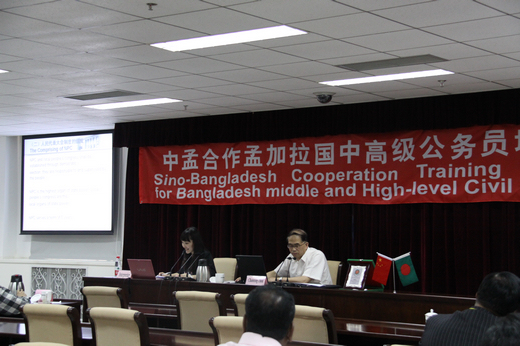
Photo 12: Mr. Zhou Chunming’s lecture on China’s political system

Photo 13: Mr. Liang Jun’s lecture on China/ Beijing/ BAC
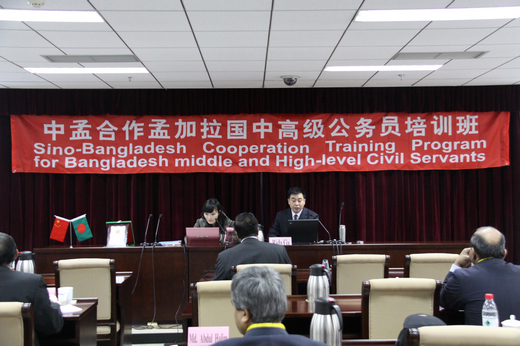
Photo 14: Mr. Ga Rida’s lecture on grid management
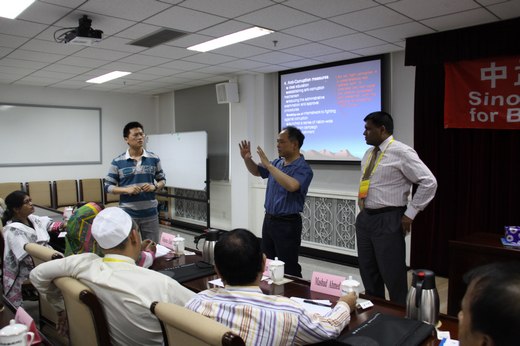
Photo 15: Mr. Ma Zhanwen’s lecture on China’s anti-corruption
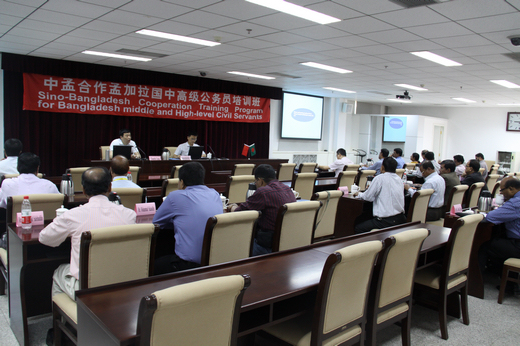
Photo 16: Mr. Zeng Xianzhi’s lecture on China’s HRM and economic development
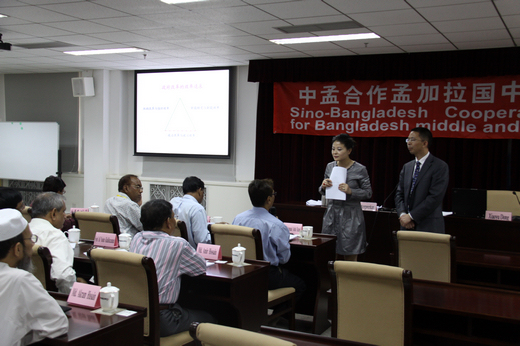
Photo 17: Mr. Dong Xiaoyu’s lecture on China’s administrative reform and local governance

Photo 18: Ms. Cao Ying’s lecture on public service delivery in China

Photo 19: Visiting the library of BAC

Photo 20: Visiting the exhibition hall on the history of BAC
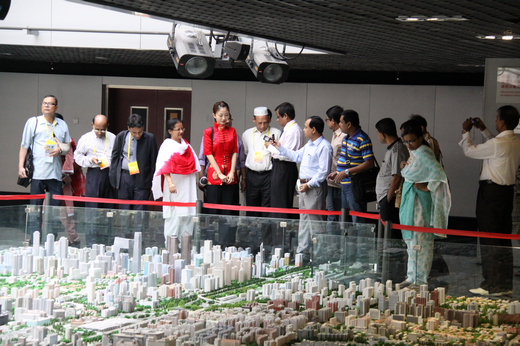
Photo 21: Visiting the Beijing city planning exhibition hall
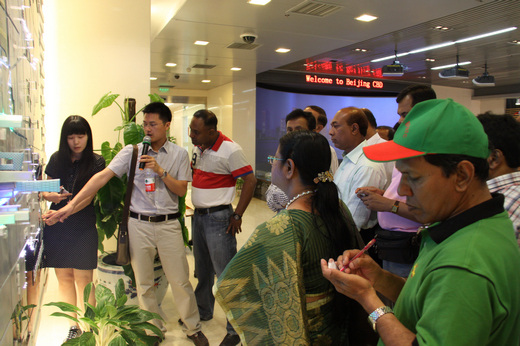
Photo 22: Visiting Beijing’s CBD

Photo 23: Visiting the exhibition center of Zhongguancun Hi-tech Zone
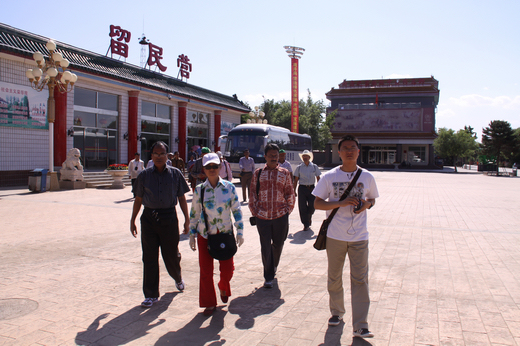
Photo 24: Visiting Liuminying farmland in Daxing district of Beijing